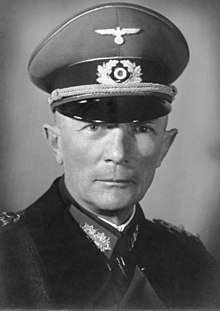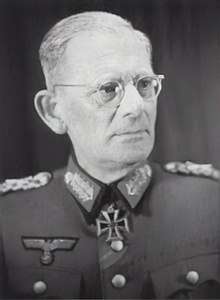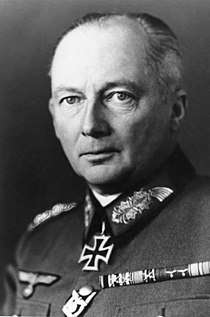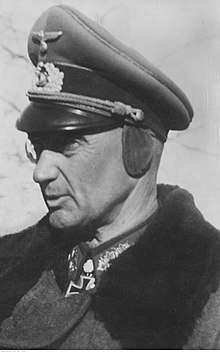Army Group B
Army Group B (German: Heeresgruppe B) was the title of three German Army Groups that saw action during World War II.
| Army Group B | |
|---|---|
| Heeresgruppe B | |
| Active | October 1939 - June 1941 July 1942 - February 1943 July 1943 - April 1945 |
| Country | |
| Insignia | |
| Identification symbol |  |
Operational history
Army Group B first took part in Battle for France in 1940 in Belgium and the Netherlands.
The second formation of Army Group B was established when Army Group South was divided for the summer offensive of 1942 on the Eastern Front. Army Group B was given the task of protecting the northern flank of Army Group A, and included the 6th Army during the Battle of Stalingrad. In February 1943, Army Group B and Army Group Don were combined to create a new Army Group South.
A new Army Group B was formed in northern Italy under Field Marshal Erwin Rommel in July 1943. Its task was to secure Northern Italy after the Overthrow of Mussolini and to disarm the Italian Army there as part of Operation Achse.
After the stabilisation of the front on the Winter Line south of Rome by Kesselring's Army Group C, and the creation of the Salo Republic in Northern Italy, Army Group B was moved to Northern France on 26 November 1943. Army Group B participated in the Battle of Normandy. On 19 July 1944, Field Marshal Günther von Kluge took command from the injured Rommel and on 17 August, Field Marshal Walter Model replaced Kluge.
Moving to the Low Countries, Model with his HQ located at Osterbeek close to Arnhem, was surprised on the 17 September by the start of Operation Market Garden. The army group also participated in the Battle of the Bulge.[1] The army group was isolated in the Ruhr Pocket in northern Germany, and after being divided up into smaller and smaller sections, the final section surrendered to the Allies on 21 April 1945.
Commanders
- Western Front
| No. | Commander | Took office | Left office | Time in office | |
|---|---|---|---|---|---|
| 1 | Generalfeldmarschall Fedor von Bock (1880–1945) | 12 October 1939 | 22 June 1941 | 1 year, 8 months |
- Eastern Front
| No. | Commander | Took office | Left office | Time in office | |
|---|---|---|---|---|---|
| 1 | Generaloberst Maximilian von Weichs (1881–1954) | August 1942 | February 1943 | 6 months |
- Northern Italy/Northern France
| No. | Commander | Took office | Left office | Time in office | |
|---|---|---|---|---|---|
| 1 | Generalfeldmarschall Erwin Rommel (1891–1944) | 14 July 1943 | 19 July 1944 (severely injured) | 1 year, 5 days | |
| 2 | Generalfeldmarschall Günther von Kluge (1882–1944) | 19 July 1944 | 17 August 1944 | 29 days | |
| 3 | Generalfeldmarschall Walter Model (1891–1945) | 17 August 1944 | 21 April 1945 † | 247 days |
Chiefs of Staff
- 12 October 1939 – 9 May 1941 General Hans von Salmuth
- 20 May 1941 General Hans von Greiffenberg
Eastern Front
- August 1942 – 20 May 1943 General Georg von Sodenstern
Order of battle
| Date | Subordinated commands |
|---|---|
| 1939 | |
| November 1939 | 4th Army, 6th Army, 18th Army |
| 1940 | |
| May 1940 | 6th Army, 18th Army |
| June 1940 | 9th Army, 6th Army, 4th Army, Panzer Group Kleist |
| July 1940 | 7th Army, 4th Army |
| August 1940 | 7th Army, 4th Army, 6th Army |
| September 1940 | 18th Army, 4th Army, 6th Army |
| 1941 | |
| January 1941 | 18th Army, 4th Army, 17th Army, 2nd Panzer Group, Military commander in the General Government |
| May 1941 | 9th Army, 4th Army |
| 1942 | |
| August 1942 | 2nd Army, Hungarian 2nd Army, Italian 8th Army, XXIX Army Corps, 6th Army, 4th Panzer Army |
| September 1942 | 2nd Army, Hungarian 2nd Army, Italian 8th Army, 6th Army, 4th Panzer Army |
| October 1942 | 2nd Army, Hungarian 2nd Army, Italian 8th Army, 4th Panzer Army, Romanian 3rd Army, Romanian 4th Army |
| November 1942 | 2nd Army, Hungarian 2nd Army, Italian 8th Army, Romanian 3rd Army, 6th Army, 4th Panzer Army, Romanian 4th Army |
| December 1942 | 2nd Army, Hungarian 2nd Army, Italian 8th Army |
| 1943 | |
| January 1943 | 2nd Army, Hungarian 2nd Army, Italian 8th Army, Army Detachment Fretter-Pico |
| February 1943 | 2nd Army, Army Detachment Lanz, Italian 8th Army, Hungarian 2nd Army |
| September 1943 | LI Army Corps, II SS Corps, LXXXVII Army Corps |
| December 1943 | in disposal of the OKW in Denmark |
| 1944 | |
| May 1944 | 7th Army, 15th Army, Wehrmacht commander in the Netherlands |
| June 1944 | 7th Army, 15th Army, Wehrmacht commander in the Netherlands, Panzer Group West |
| August 1944 | 1st Army, 5th Panzer Army, 7th Army, 15th Army, Wehrmacht commander in the Netherlands |
| September 1944 | 7th Army, 1st Parachute Army, 15th Army |
| November 1944 | 7th Army, 5th Panzer Army, Student Army Group |
| December 1944 | 7th Army, 5th Panzer Army, 6th Panzer Army |
| 1945 | |
| January 1945 | 7th Army, 5th Panzer Army, 6th Panzer Army, 15th Army |
| February 1945 | 7th Army, 5th Panzer Army, 15th Army |
| April 1945 | 15th Army, 5th Panzer Army, Army Detachment von Lüttwitz |
References
- Builder, Bankes & Nordin 1999, p. 106.
Bibliography
- Builder, Carl H.; Bankes, Steven C.; Nordin, Richard (1999). Command Concepts: A Theory Derived from the Practice of Command and Control (PDF). Santa Monica, CA: RAND. OCLC 831691894. Retrieved 16 January 2020.


.jpg)

